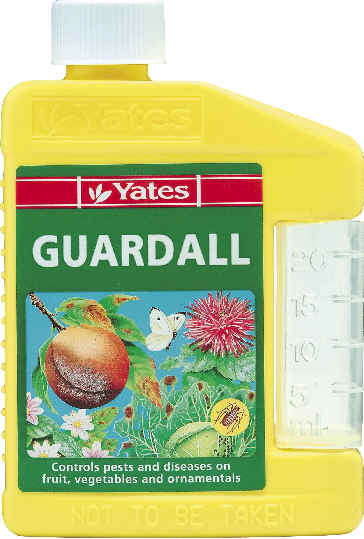Yates
Product of the Month
April 2008
Sulphate
of Potash

Yates Product of the Month
May 2008
Guardall
Yates Product of the Month for
May 2008 Guardall is a combined insecticide/miticide/fungicide that
controls
a wide range of pests and diseases on tomatoes, cabbages, stonefruit and ornamental
plants
like roses.
Guardall's a
great clean-up spray for the garden. Inexperienced gardeners, particularly, often
find it
difficult and daunting to identify garden problems but, because of
Guardall's wide spectrum of
application, a specific diagnosis of the problem
isn't always absolutely necessary.
Guardall
controls sapsucking pests like aphids, thrips, mites and whitefly, leaf chewers
such as
cabbage white butterfly grubs, and fruit munchers like tomato fruitworm.
At the same time this clever
product also helps protect plants from common
fungal diseases such as black spot, powdery mildew,
botrytis, downy mildew
and brown rot.
Guardall is a combination
of two different fungicides and a low toxic synthetic pyrethroid insecticide.
It
comes in a 200 mL concentrate bottle with its own convenient measuring
cylinder clipped on the side.
A check of the dilution recommendations on the
label shows how economical Guardall is: most
problems can be treated with
a solution of 10 mL of concentrate liquid mixed in one litre of water.
Application
information for specific problems, and information about withholding period for
fruit and
vegies is also found on the label.
Affected
plants should be sprayed with Guardall at 7- 14 day intervals until there are
no further signs of
pest or disease activity. Fortunately, once the spray
has dried, Guardall is unlikely to be hazardous for
bees that are foraging
in the garden.
It's important to remember,
too, that healthy plants are less likely to be attacked by pests or diseases
so
keeping plants well fed, well watered and making sure they're growing in a suitable
situation will go
a long way towards preventing many garden problems.
_________________________________________________________________________________________________________________________________________
_________________________________________________________________________________________________________________________________________
 Week 1 | Week
2 | Week 3 | Week 4|
Product of the Month
Week 1 | Week
2 | Week 3 | Week 4|
Product of the Month 